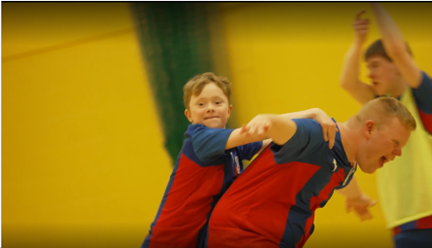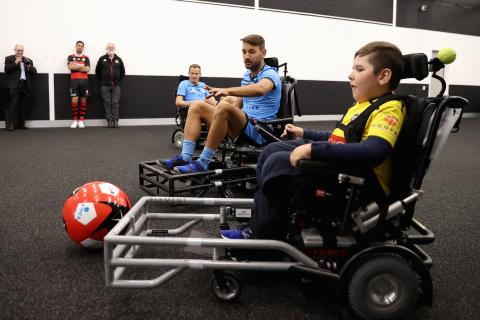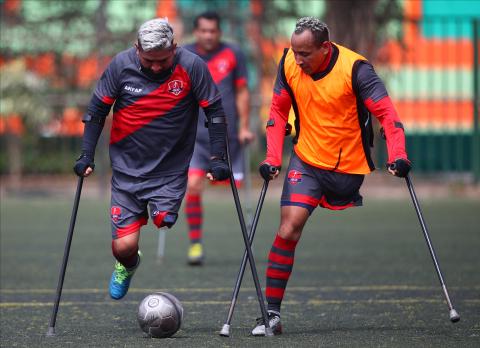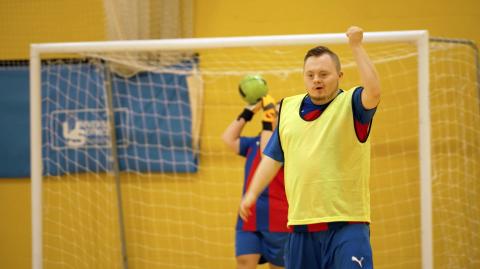Guide to Varieties of Adapted and Disability Football

With the FIFA Women's World Cup Australia and New Zealand 2023 kicking off down under this week, we take the opportunity to highlight the every growing list of inclusive and adapted ways that the disabled community can take part in the sport that you might not be aware of.
DIFFERENT TYPES OF ADAPTED FOOTBALL
From fun grassroots participation and meeting new people, through to pan-disability and impairment specific leagues. The range of adaptive football opportunities includes:
- Powerchair football
- Blind and visually impaired football
- Walking football
- Amputee football
- Cerebral Palsy and frame football
- Football for people with learning disabilities
- Deaf and hearing impairment football
Read more about each below.
Powerchair football
Specially adapted electric wheelchairs provide the opportunity for people with a high level of impairment, or those who have limited movement in a manual chair, to access this fast paced and dynamic 4 vs 4 game.
Taking place on a 30 x 18m indoor pitch and utilising a larger 33cm diameter, the 20 min each way game is also unique as it sees people of all ages, disabilities and genders to compete side by side.
Blind and visually impaired (VI) football
There categories are used to differentiate between blind and visually impaired players, along with which version of the Futsal adapted game they can play in:
In blind football all outfield players are classified as blind or B1, and have to wear blindfolds and eye patches during this 5-a-side game. Goalkeepers can be sighted or partially sighted, and while limited to a small area in front of the goal, play a critical role alongside two further guides in communicating with the outfield players. The ball is stitched with panels containing metal shards, creating noise as it rolls to help players hear and locate it.
While classifications exist for competitive games (B2 and B3 for international level and extended to include B4 and B5 domestically) VI football is open to all partially sighted outfield players and goalkeepers and fully or partially sighted.
Amputee football
Adapted for amputees, people with congenital limb deficiencies and persons with restricted use of limbs. At a grassroots level players can choose whether to play with or without their prosthesis, both in amputee-specific and also within pan-disability teams/sessions.
Walking football (see below) is also a popular adaption for amputee players, and with advance approval, players can also use a prosthesis within traditional mainstream football.
Walking football
As the name suggests, this 5-a-side version is played at walking pace and players not allowed to run. The no contact tackling and ball below head height adaptions help open the game up to those with health issues and mature players.
Cerebral palsy (CP) football
This 7-a-side game is open to players, able to stand or walk, with cerebral palsy and other neurological disorders such as stroke and traumatic brain injury. CP football takes place on a smaller pitch, with smaller goals and a 30 mins each way format. The off-side rule does not apply, and when awarded a throw-in, players can choose to roll or throw the ball back into play.
Football for people with learning disabilities
This is a broad category that sees clubs and teams available for a wide variety and severity of learning disabilities, including Down's Syndrome. Some adaptions see 5-a-side versions of the game and players must meet 3 eligibility criteria - 1) The person must have an IQ of 75 or below, 2) The person must have limited ‘adaptive behaviour’ which means they might need help with everyday tasks, for example cooking or travelling by public transport, 3) The learning disability must have occurred before the age of 18.
Deaf and hearing impairment football
Played with exactly the same rules as the non-disabled game, this adaptation is open to players who have lost 55 decibels or more of their hearing and all hearing aids must be removed at the start of a game.
How to find a local club
Firstly...
Search via your postcode on Every Body Moves
You can also check out information from these great resources:
- The FA
- The England Amputee Football Association
- Cerebral Palsy Sport
- England Deaf Football
- The Walking Football Association
- The Wheelchair Football Association


